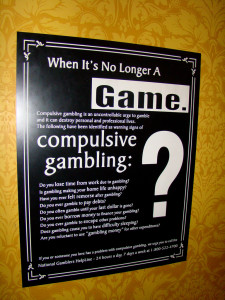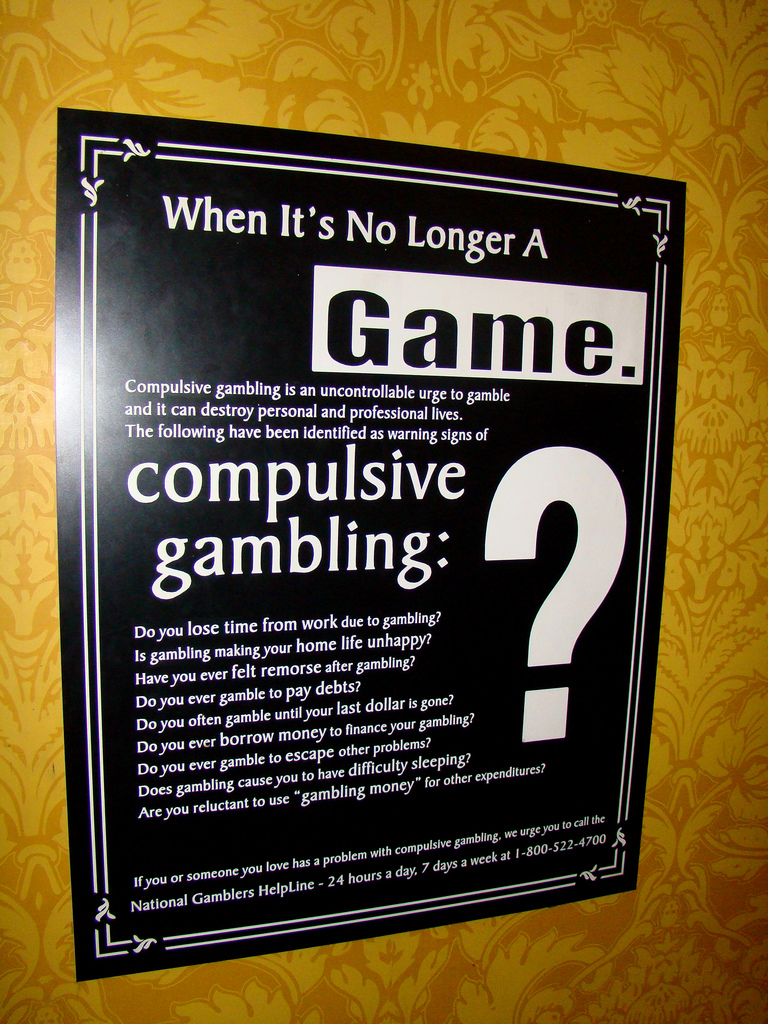 Gambling: One Problem that Our Country Is Confounded By – Vol. 304, April 9, 2015
Gambling: One Problem that Our Country Is Confounded By – Vol. 304, April 9, 2015
There are approximately 6 million gambling addicts in the United States. Due to the fact that many gambling addicts are skilled at hiding their behavior, it is difficult to measure the social and economic effects of it. Pathological gamblers have higher rates of divorce, suicide, physical abuse, with about 66% of them have committed a crime to cover their debts.
Less than 1% of Americans are classified as problem gamblers, people who are known to have an impulsive control disorder. The state of Nevada was shown to have the largest percentage of problem gamblers at 4.3% in a federally commissioned report back in 2002. Given a closer proximity to gaming venues, the percentage of problem gamblers goes up.
A problem gambler would be understood as a person who will gamble more money than they can afford to lose, spends so much time gambling that relationships with the people close to them are neglected, will borrow money to cover gambling losses, sometimes lying to get the money needed to cover their debts. In the worst cases the gambler will commit crimes to cover gambling debts.
A study in Canada showed 3 to 4% of college aged kids have a gambling addiction versus 0.8 to 2% of adults. Teens are not seen as problem gamblers, though many become addicted at an early age as a result of being taken to horse races and getting a “high” from the activity there, or perhaps growing up in families where poker games were played regularly. Many times the gambling for youth doesn’t get out of control till they become teen agers with college loans, with the loan money going to gambling rather than for the schooling the loans were meant to cover. When the student is unable to regain the lost money, the life’s path is changed no longer being able to continue with college.
One in five gamblers will try to commit suicide, feeling hopeless that the huge debts incurred will ever be repaid.
The saddest part of teen gambling is that no one is even asking the kids if they are having a problem with it, so the programs that are out there to treat them, are not getting the referrals for treatment.
Like many addictions, gambling starts out being a fun activity, which in time progresses out of control for those who use it to stop thinking the negative thoughts they don’t wish to think. As an addiction, the compulsive thoughts lead to the impulsive behaviors, with the dopamine rush making it impossible for the addicted gambler to leave the game before running up massive debts.
Because one can’t smell the alcohol on the breath, see the glazed eyes, or notice the track marks that those addicted to substances show, it is easier for the gambling addict to slide by, allowing the problem to get ever more out of control till the gambler’s life and those they love are over taken by the losses incurred by the gambler’s addiction.
In the state of California casinos are mandated to have brochures near the telephones and ATM machines for those with a gambling problem to be able to take with them to receive the help they require. Most of these programs use a 12-step methodology to work with their participants, something that I as a hypnotist find horrifying. Why would anyone want to tell their unconscious mind that they are an addict and will always be an addict, when the fact of the matter, is that one needn’t put that crap into one’s mind. One needn’t feel stuck with any addiction from my experience.
The best way to help any addict is to help them to find a compelling future that is more meaningful then the addicted behavior while doing the work necessary to have them “fall back in love with themselves.” Once that is accomplished the negation of the addiction can be done along with the setting of new boundaries. This includes making friends with people who don’t gamble while staying away from gambling venues. The only problem is that on-line gambling is becoming more pervasive. The best way to deal with that is to help the gambler to become what I call a “non-gambler,” meaning that they no longer have the thoughts or feelings of a gambler. It is when this is achieved that the problem is no longer a part of the client’s life.
The younger the client is when they show up to have the work done, the quicker and easier the process becomes. Younger people are already in a hypnotic state, not yet having fully developed their pre-frontal cortex, making them naturals for this hypnotic work.
For older clients, they have to be completely committed to doing “whatever it takes” to turn their lives around. It is possible for anyone who has decided to be through with the addiction, through with the destructive mindsets and ready to live a life that is happier and more fulfilling than the one lived in the shame and poverty that gambling creates.

Sign Up Now for your Free 1/2 Hour Consultation
If you have found this website helpful and informative and either you or someone you care about has an issue that might need clearing. Then Suzanne would like to invite you to experience a 1/2 hour free no obligation consultation via phone or Skype. Suzanne has successfully helped people all over the world, why not give her the chance to help you. Get the facts about your personal situation from a caring professional source and change your life for the better today!
Sign Up Now for your Free 1/2 Hour Consultation
